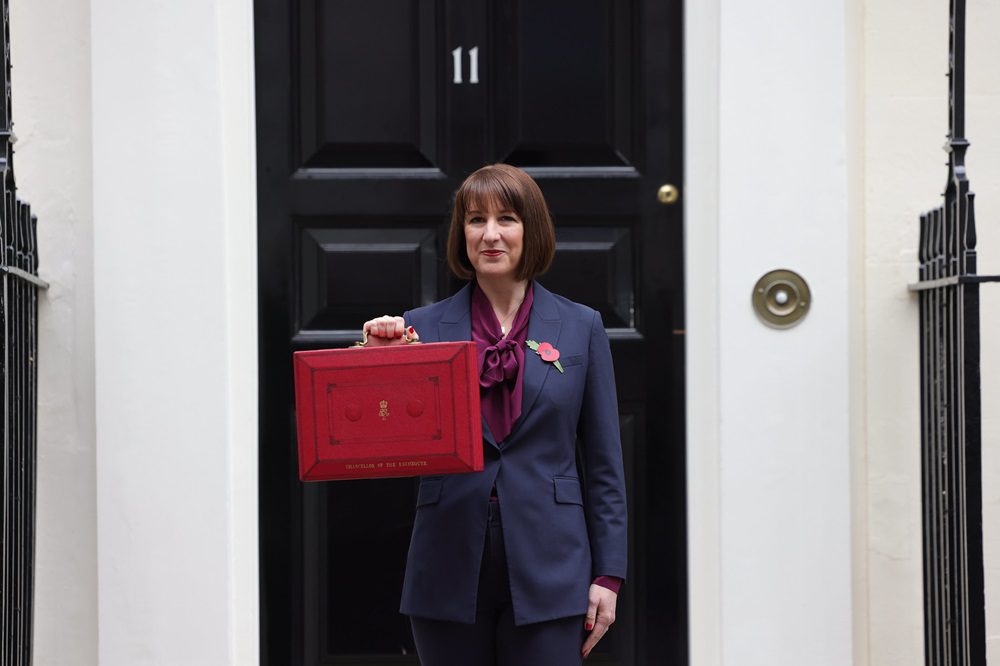Budget 2024 Reaction: A challenge for construction

This post was originally published on this site

Chancellor Rachel Reeves seemingly had a lot of work to offer the construction industry in her first Budget this week, but on taxes and NI has she muffled the sector’s clout?
The chancellor of the exchequer, Rachel Reeves certainly threw a lot into her first Autumn Budget this week; all but the kitchen sink, it almost feels.
There’s certainly a lot to digest, and it’s going to be keeping policy wonks, economists, business analysts and company chiefs busy for a while yet, no doubt, as they contemplate the implications for the months and years ahead.
Even so, as is the way of these things, there’s been plenty of quickfire comment and analysis to piece together; below there’s a selection of some of the industry’s initial thoughts.
Certainly Reeves’ Budget was a historic occasion, so she can probably be excused for making a heavy meal of it: On an personal level, it was her first Budget; politically, it was also the first Labour Budget in over 14 years; and on a historical note – the first Budget presented by a female chancellor. But it’s the content that matters in the long run,
Reeves’ programme set out what the government hopes will lay down the foundations for economic growth and prosperity; plug the £22bn black hole in government funding we’ve heard so much about, too.
The Budget was billed on getting Britain building again, on fixing the foundations; turning a slogan into spades on the ground, as it were. And the reaction is somewhat mixed as to the government’s fortunes in this regard, it’s fair to say.
There were plenty of funding commitments; £500m to build an extra 5,000 social homes, for instance. There was the promise of £1bn next year to speed up the remediation of buildings wrapped in unsafe cladding. Likewise money for the Warm Homes Plan to improve the energy efficiency of homes.
On large scale projects, the Budget offered backing to refurbish and improve the nation’s schools – including dealing with RAAC – as well as heal our ailing and crumbling hospitals. Then there’s funding for councils to repair and maintain roads – diminish all those potholes.
Staying on transport, the chancellor issued some key pronouncements on HS2; to complete the link from Old Oak Common to Euston. There was the promise of electrification for rail in the North; and an East-West rail line to link up Milton Keynes, Oxford and Cambridge.
Plenty of work there for the construction industry and its associated sectors; reasons to be cheerful, but there was a glum side too.
Investment was the key word to so much of the Budget, but it wasn’t all on the upside. Changes to taxation – especially the rise in employers’ National Insurance contributions sit heavy on the industry’s thoughts.
Reeves’ Budget certainily presented the sector with challenges, as Glenigan put it, but it’s not without opportunity, too.
The company welcomed the chancellor’s changes to the Fiscal Rules, regarding the change as important because it potentially will “free up greater scope for critical capital expenditure”. Crucially, this will allow more borrowing to invest in schools, health, infrastructure, industry, and social housing.
Perhaps the biggest surprise, Glenigan added, was the scale of investment set aside for critical infrastructure and other construction related activity, with the Budget mentioning projects like the HS2 Old Oak Common to Euston extension, and the TransPennine upgrade, which have been hanging in the balances over the last four months; these “may actually get off the ground in the next fiscal year”, the company says.
There will be plenty of work within the education sector, given the “generous” pot of £2.1bn allocated towards upgrading outdated and crumbling stock, particularly to address the endemic problem of RAAC in facilities, Glenigan said.
Allan Wilen, Glenigan’s economics director, said: “Contrary to expectations, it seems the Budget has come as a much-needed and welcome surprise to the entire construction sector. With much-needed capital now being freed up, there’s so much potential to unlock growth and clear and increasingly clogged pipeline of projects.
“The signals are positive and bode well for next year’s keenly anticipated Spending Review. We’re in no doubt this government does want to invest in building, and we look forward to seeing how these exciting announcements unfold over the coming months.”
Dr David Crosthwaite, chief economist at the Building Cost Information Service (BCIS) is rather less upbeat the chancellor’s first Budget.
He said: “Reeves announced £100bn in capital spending over the next five-years with the mantra ‘invest, invest, invest’, but I’m not convinced this is a Budget for growth.
“There are conflicting announcements, and as it stands the investment outlined in the Budget is unlikely to make a material difference to the construction sector and ‘get Britain building again’ – a stated aim of the government.
“I was hoping for something a little more radical, but perhaps that will come in the Spending Review next spring.
“We really need the government to invest in fixed capital programmes that will actually ‘get Britain building again’ and drive wider economic growth. Four months in and this feels like a missed opportunity for the new government.”
But, he added: “The government did announce spending on construction projects, such as schools, social housing and transport to name a few.
“However, it still remains unclear how the government intends to meet its self-imposed target of building 1.5m homes over the life of the Parliament, without tackling the existing skills shortage.
“The resurrection of the HS2 link from Old Oak Common to Euston is a positive move, but we need more commitment to other infrastructure projects in the pipeline with the Lower Thames Crossing project a prime example.”
The point about construction skills was – naturally – picked up by the Construction Industry Training Board (CITB). The organisation welcomed the support for the construction sector via increased investment in the Affordable Homes Programme, infrastructure, and schools projects, among others, but pointed out this will call for for more people to carry out the work.
Tim Balcon, the CITB’s chief executive, said: “Our research shows that under the government’s homebuilding plans, up to an additional 152,000 workers will need to be found, and this doesn’t include the quarter of a million additional construction workers we need to meet all forecasted construction demand through to 2028.
“The homebuilding and infrastructure delivery challenges can’t be addressed without evolving and improving the skills system as a whole – for example, improving the pipeline of workers and ensuring a shared understanding of competence between industry, government, and CITB is defined.
“This is why CITB has been working collaboratively and at pace with the government and industry to develop interventions to meet the construction workforce skills needs to deliver its homebuilding ambitions.
“A strong pipeline of apprentices and construction workers is required to build the millions of homes we need, and key to achieving the government’s ambitions is to get the right skills policies in place. It is essential that the new Growth and Skills Levy drive up construction apprenticeship numbers that have declined under the Apprenticeship Levy. Last year CITB helped over 29,000 apprentices during their courses.
“However, apprenticeships aren’t the only route into a career in construction, and we need to ensure we’re making all the available pathways into the industry clear and accessible for people, including upskilling and identifying transferable skills from other industries. We’re ready to work with government, industry, and training providers to ensure that the coordinated reforms are put in place to drive sustained growth in the construction industry.”
Challenging budget
The Federation of Master Builders (FMB) described the Budget as “challenging” for small firms as they grapple with the “significant” rise in employers’ National Insurance contributions, but also increases in Capital Gains Tax.
Brian Berry, the FMB’s chief executive, said: “The Budget was the first opportunity for the new government to set out its long-term financial plans for the country. In challenging economic conditions, the chancellor of the exchequer delivered a mixed Budget with promising plans for the long-term future of the construction industry, however it is likely to present substantial challenges to firms managing their business finances.
“At a time when SME builders are needing a boost, they may, like many in the country, have to take a hit before they see things get better.
“The chancellor’s decision to significantly increase employers’ National Insurance contributions will create major headaches for firms looking to take on staff at a time when the building industry is in desperate need of new workers.
“However, it is good that the chancellor has shielded small companies by increasing Employment Allowance, as is the rise in the Apprenticeship wage which will help increase the appeal of a career in construction for young people. Capital Gains increases may also hit builders looking to sell off their companies when they look to retire.”
Richard Beresford, chief executive of the National Federation of Builders, said: “The 2024 Budget was always going to be challenging due to the ongoing £22bn black hole narrative. Nevertheless, it is positive to see the suspected fuel duty rise did not happen, especially as the construction industry is already paying considerably higher fuel costs after the last government cut their access to red diesel.
“We also welcome the £5bn funding boost for affordable housing, [the] commitment allowing councils to retain 100% of Right to Buy receipts and, the £3.4bn for retrofitting.
“However, the government’s target to deliver 1.5m homes is now at a considerable risk due to the increase in Employer National Insurance contributions. This announcement will hinder the industry’s ability to take on and train new staff and support the next generation of skilled workers.
“While some may point to planning reforms as the solution, those reforms have not yet been implemented, and it will take years before new projects avail of them.”
Civils contractors, however, have welcomed the Budget as what the Civil Engineering Contractors Association (CECA) has called a “‘blueprint’ for sustained economic growth”.
Marie-Claude Hemming, CECA’s director of operations, said: “The infrastructure sector in the UK is primed to deliver on the government’s ambitions to drive growth in the economy.
“While undoubtedly this Budget contains tough measures that are aimed at ameliorating the UK’s constrained economic position, the chancellor’s decision to alter her fiscal rules to allow investment in infrastructure is one that CECA has called for in recent weeks.
“It is right that the government maintains a strong commitment to controlling day-to-day spending while creating headroom to allow for investment in a long-term infrastructure programme to secure the economic and social wellbeing of UK plc.
“We are particularly pleased to see the chancellor make a commitment to rail upgrades such as the Transpennine upgrade, putting funding in place to link HS2 to Euston, and increased funding for local roads maintenance.
“In addition, plans to roll out carbon capture and storage schemes and new green hydrogen projects will act as a basis for allowing Great British Energy to play fulfil its role in transforming Britain into a clean energy superpower.
“This renewed focus on delivering growth and streamlining planning will allow projects to move more quickly to market, allowing our members to serve businesses and communities in all parts of the country by delivering the world-class infrastructure we all rely upon.
“The success of the government’s plans will rely upon unlocking all potential sources of infrastructure finance and working closely with industry to ensure the skills are in place to deliver the planned pipeline of schemes.
“CECA stands ready to work with our members, the government, and the entire supply chain, to ensure that the UK’s infrastructure sector is primed to deliver on this blueprint for growth and build a better future for businesses and communities across the UK.”
Professor Noble Francis, economics director at the Construction Products Association (CPA), said: “The chancellor announced a challenging Budget that we believe provides room for cautious optimism. Whilst prioritising the stabilisation of UK finances and promotion of growth across the economy, there were a number of measures related to supporting the construction and manufacturing sectors and our key asks.
“Chief amongst those will be the near-term spending increases in affordable house-building; continued spending on repair, maintenance and improvement for a select group of hospitals; a wider commitment to increased capital investment including maintenance programmes for the NHS, schools and transport infrastructure including an almost 50% increase in funding for local roads maintenance; fuel duty relief (our sector is one of the largest users of the road network); an initial £3.4bn towards heat decarbonisation and household energy efficiency through the Warm Homes Plan over the next three years; incentives for corporate R&D investment; and provision for a new Industrial Strategy.
“That said, we also have concerns over the government’s 10-year infrastructure and new housing strategies, which the industry will have to wait until Spring 2025 at least to learn about. Similarly, the New Hospitals Programme remains under review, although details are expected sooner, in November.
“Whilst the significant rises in the National Living Wage will benefit workers, it will increase costs significantly for employers. This is not only due to those on the National Living Wage but also for those on the levels above this who will want to maintain the premium. In addition, the increases in employers’ contributions to National Insurance will also add extra costs for employers at a time when the construction product manufacturing and distribution sectors have been hit hard over the last 18 months.”
He added: “This government will soon face a critical juncture, when its plans and ability to deliver its national infrastructure and construction pipeline will hopefully establish its credibility with industry, in marked contrast to its predecessors. Our hope and ambition is that government appreciates the importance of the UK construction sector as an enabler for growth, productivity and so many of its policy ambitions.”
Further reaction
Richard Steer, chair of Gleeds Worldwide, said: “This was a Budget designed to put election rhetoric into economic strategy, and having had more leaks than the Manchester United defence, there were few surprises.
“Our sector is one of the largest employers, and hikes in Nat Insurance and increases in Labour costs are going to dampen the appetite for recruitment in an industry that already needs to employ just under 251,500 workers by 2028 to just stand still.
“Funding for bringing HS2 to London was sensible, and I wait to see details on refurb plans for the schools, roads and health. But the Budget did little to persuade me that they treat our challenges on training, retention, planning reform and meeting net zero targets with any more seriousness than the last government.
“Finally it is worth noting that aerospace and car manufacturing sectors were supported with funding by the chancellor. Construction has a greater impact on the economy than both these sectors combined.”
Chris Sargent, UK managing director for real estate at Turner & Townsend, said: “[The] Budget has been a chance to reiterate to private investors that Labour wants to do business. In real estate terms, the emerging industrial strategy and announcements today signal where growth is expected to come from as the government seeks to ‘pick winners’ in life sciences, gigafactories and creative industries.
“More widely, we have had commitments to build the social infrastructure needed to support and sustain growth, with major funding commitments for affordable housing, hospitals and schools.
“However, the onus to build and to build well falls on a fragile construction sector. If Labour wants industry capacity to be built up and programmes delivered at pace, we will all need to work together to ensure the stability and performance of our supply chains and our industry.”
Richard Mussell, managing director of specialist surveying and construction consultancy, Rund, said: “In this Autumn Budget, the chancellor has set the tone for growth towards building 1.5m new homes over the next five years, albeit with caveats that I believe need to be addressed to ensure that investment is maximised.
“For affordable housing, the historic reduction in private newbuild housing has increased the pressure on housing associations to maintain the flow of affordable homes across the country. The package to deliver up to 5,000 new affordable social homes with £500m in new funding for the Affordable Homes Programme is welcome.
“But I would have liked to have seen the announcement of more affordable lending options for housing associations and developers – especially to unlock more opportunities for joint ventures, and encourage the much-needed development of new affordable, and for that matter private residential, property on the government’s recently announced £68m investment in brownfield site housing development.
“Rund sees first-hand the many challenges that brownfield sites have, and funding alone cannot unlock disused brownfield sites.
“We urgently need the right construction skills and expertise to navigate a new influx of development on brownfield sites and indeed the wider need for new build housing development through effective planning, development and delivery. As a lack of skilled workers in our sector remains a key issue, and the chancellor’s reiteration of its plans to hire 300 new planning officers in my opinion does little to address the true scale of the problem. We need to meet the skills shortage head on, and it is still to be seen what Skills England will achieve for our sector.
“It is important to remember that property and construction is resilient. When looking at the Budget through this lens, we as an industry can do more to extract the positives and navigate any challenges.”
Tom Dodson, chief operations officer at Better Green Living, said: “With government’s promise to commit £1.4bn into rebuilding schools, the need to look further at the sector as a whole is required to modernise and future proof some of our most significant buildings.
“Retrofitting presents an opportunity to protect and renovate schools and higher education buildings, bringing them up to be more energy efficient and less carbon intensive than building new. Without the support from the UK government, this unfortunately isn’t feasible.
“Investing in well-designed institutions, which are crucial for the next generation’s development, will enrich students’ overall experience in the spaces where they spend so much of their time.”
Too little, too late
Andrew Bulmer, chief executive of The Property Institute, said: “Government has rightfully recognised that the pace of remediating buildings has been too slow. There are still 3,000 residential buildings that have not yet been made safe. We welcome the remediation investment announced, but the acceleration plan needs to move forward with urgency in three clear areas to protect residents.
“Firstly, we need remediation funding schemes consolidated under one delivery partner to improve efficiency and transparency over the application process; secondly, there must be a defined deadline for completion of works – holding to account developers who have pledged to fix the safety problems; and thirdly, we want to see greater collaboration with our industry to help develop the acceleration plan, to ensure that it works in practice and is proportionate.”
Nicola John, managing director at Fire Door Maintenance, part of UAP Ltd, said: “The government’s plans to invest in cladding removal are too little too late. Instead of addressing the root causes of poor fire safety standards, this step only addresses the symptoms.
“To truly overcome the causes of catastrophes like Grenfell, we need to train the industry to understand the entire lifecycle of fire safety products so there are no knowledge gaps. It’s only with this that the industry can move forward, and we need regulatory oversight in place from the top down.”
Green concerns
Don Mclean, chief executive of IES, said: “The Budget’s lack of focus on green investment for buildings is a missed opportunity. It overlooks the potential for job creation, energy cost savings, and technological innovation that could stem from a robust green building initiative.
“Investing in the decarbonisation of the built environment is not just an environmental imperative – it’s an economic one. By neglecting this sector, we risk falling behind in the global race towards sustainable development and missing out on the economic benefits that come with being a leader in green technology and practices.”
Mohamed Gaafar, chief executive and co-founder of GRYD Energy, said: “It’s encouraging to see the government earmark over £1bn in investment into the Warm Homes Plan next year alone, which will make homes around the country cleaner and cheaper to run. This investment is expected to speed up the deployment of a number of measures to improve the living standards of UK homes, including the roll-out of solar to many more households.
“This investment can’t come quick enough. Beyond the future-proofing of Britain’s housing stock, the UK is still extremely vulnerable to volatility in the global energy markets. Over 9 million UK homeowners haven’t been able to access the bill-saving benefits of solar due to the high upfront costs.
“This announcement from the government is a promising step towards fixing that and helping more Brits to become energy independent and regain control of their household bills.”
Tom Armstrong, managing director of Project Solar, said: “We welcome the plans outlined by the chancellor to increase investment in renewable energy and housing. Kickstarting the Warm Homes Plan to help social housing providers deliver energy upgrades is an important step on the UK’s path to net zero.
“The provision of £5bn to build 1.5m homes during this Parliament will at least be welcome news to some, but the Budget fell short of outlining how these homes are going to be built sustainably.
“Our most recent market research revealed that 70% of the UK public believe solar panels should be mandatory on new build properties. Now is the time to make that happen. We urge the Government to work closely with house builders and renewables businesses to ensure that all future homes are built with cleaner, cheaper energy in mind from the outset.”
Charlotte Lee, chief executive of the Heat Pump Association, said: “Given the challenging economic climate, it’s promising to see an initial commitment of £3.4bn towards heat decarbonisation and household energy efficiency over the next three years, as well as an increase in funding for the Boiler Upgrade Scheme for the next two years.
“However, more needs to be done to support the acceleration of the electrification of heat if the UK is to stay on track and meet the carbon emission reduction targets in line with the legal obligations. We therefore await the details of Phase 2 of the Spending Review with interest.”
Daniel Särefjord, chief executive of Aira UK, said: “”The new funding for the Boiler Upgrade Scheme in Rachel Reeves’ Budget demonstrates the government’s commitment to supporting households in achieving lower energy bills, greener homes, and enhanced energy security.
“With heat pump installations hitting record levels, it’s evident that more consumers are seeking sustainable alternatives to gas boilers. The Budget outlines a vision for transforming homes nationwide and this historical change will be achieved by modernising planning policy, shifting taxes from electricity to dirty fossil fuels and renewing the nation’s dedication to net zero. I hope this budget marks an exciting moment for green energy initiatives and clean energy-tech adoption in the UK.”
Main image: The chancellor of the exchequer, Rachel Reeves delivers the Autumn Budget 2024. Credit: Kirsty O’Connor / Treasury. Some rights reserved.
Read next: Egyptian cement plant gets decarbonisation tech
Are you a building professional? Sign up for a FREE MEMBERSHIP to upload news stories, post job vacancies, and connect with colleagues on our secure social feed.





Responses